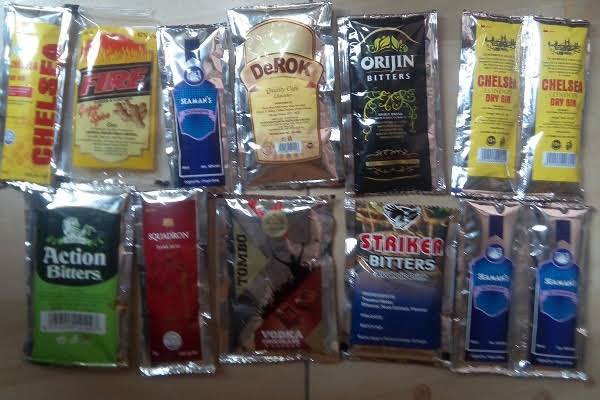The National Agency for Food and Drug Administration and Control (NAFDAC) has banned alcoholic beverages packaged in sachets that are smaller than 200ml.
The agency said the five-year window given to the manufacturers of the products to stop producing them in sachets and pet bottles, which began in 2028, elapsed on January 31, this year.
NAFDAC’s Director General, Prof. Mojisola Adeyeye, announced the ban while addressing reporters yesterday in Abuja.
- How we uncovered $2.4bn false forex claim — CBN governor, Cardoso
- Over 500 doctors, nurses, others left National Hospital in 2 years – CMD
The NAFDAC boss said the enforcement of the ban took effect on February 1.
She said the ban was not a sudden development but the outcome of a multilateral committee which agreed that the ban would be in phases whereby production would be reduced by 50 per cent by 2020 while outright ban would take place on January 31, this year.
Given the decision, Adeyeye said NAFDAC did not issue renewal licences exceeding last month to any manufacturer of the products.
According to her, the agency took the route of wiping out the drinks in such sachets because of the negative effects on underage children.
The NAFDAC boss explained that since the drinks are packaged in pocket-friendly sizes, accessible, and affordable, children easily fall for the packages and face the consequences.
She said: “This decision was based on the recommendation of a high-powered committee of the Federal Ministry of Health and NAFDAC on one hand, the Federal Competition and Consumer Protection Commission (FCCPC), and the Industry represented by the Association of Food, Beverages and Tobacco Employers (AFBTE), Distillers and Blenders Association of Nigeria (DIBAN), in December 2018, on the other hand.
“As commitment to the decision reached at the end of this committee’s meeting, producers of alcohol in sachets and small volume agreed to reduce the production by five per cent with effect from January 31, 2022 while ensuring the product is completely phased out in the country by January 31, 2024.”
According to her, the future of the country supersedes other considerations in the enforcement of the policy.
The NAFDAC boss stressed that saving Nigerian children and protecting the health of the larger society was paramount to the agency.
She added: “The people who are mostly at risk of the negative effect of consumption of the banned pack sizes of alcoholic beverages are the under-aged and commercial vehicle drivers and riders.
“The World Health Organisation (WHO) has established that children who drink alcohol are more likely to use drugs, get bad grades, suffer injury or death, engage in risky sexual activity, make bad decisions and have health problems.
“The WHO also stated that harmful consumption of alcohol is linked to more than 200 health conditions, including infectious diseases (tuberculosis and HIV/AIDS) and non-communicable conditions (liver cirrhosis and different types of cancer).
“It is also associated with social problems, such as alcohol addiction and gender-based violence.
“To curb the menace of abuse of alcohol, the WHO recommended some actions and strategies to policy makers that have shown to be effective and cost-effective. These include: regulating the marketing of alcoholic beverages (in particular to younger people) and regulating and restricting the availability of alcohol.”





